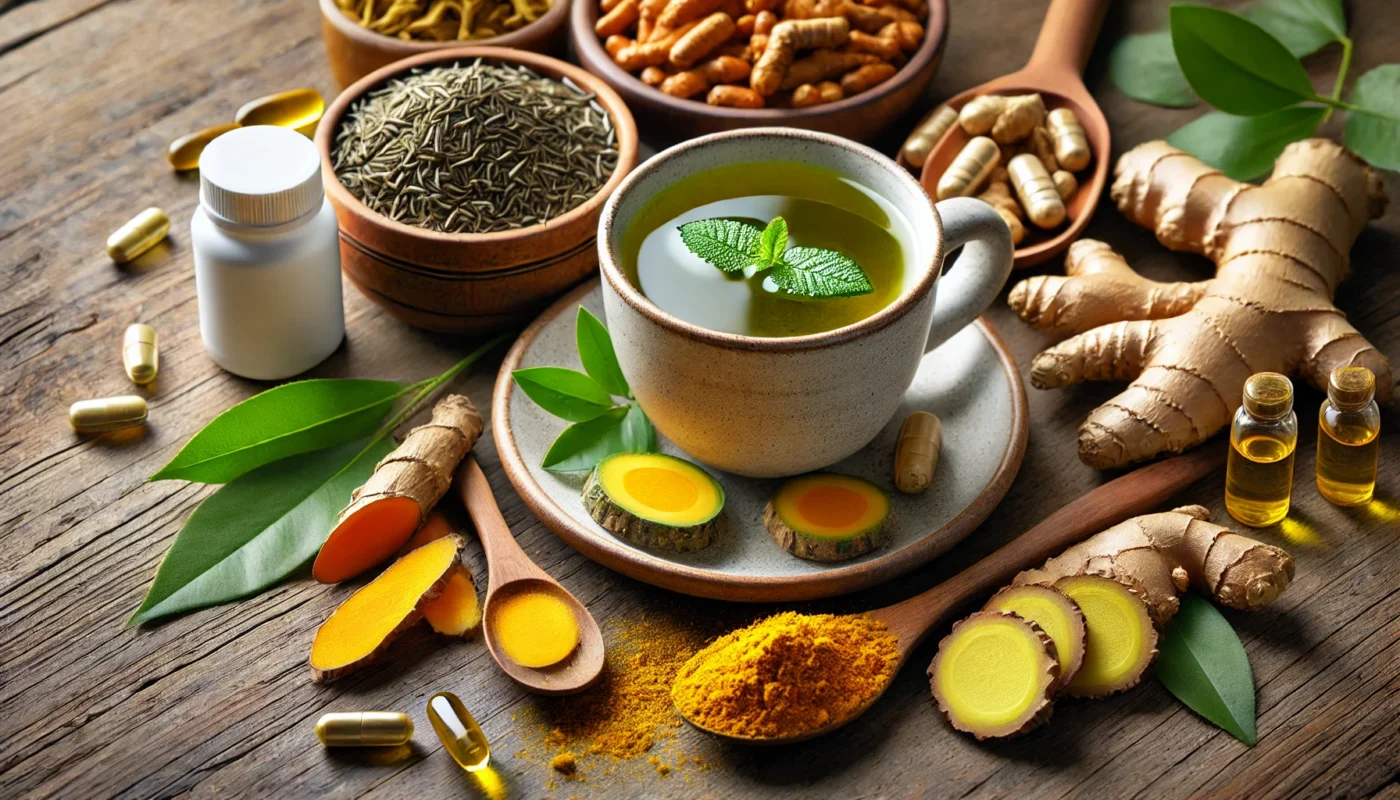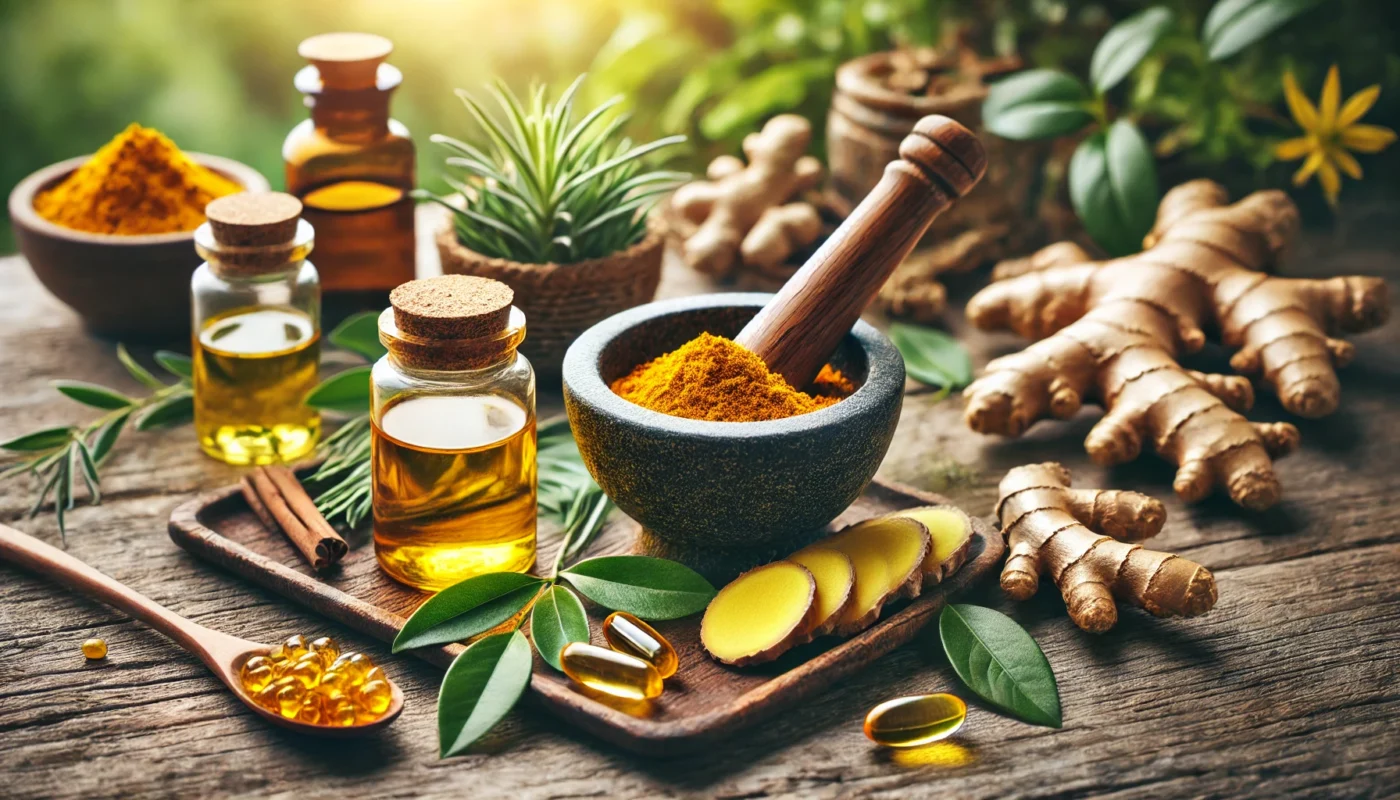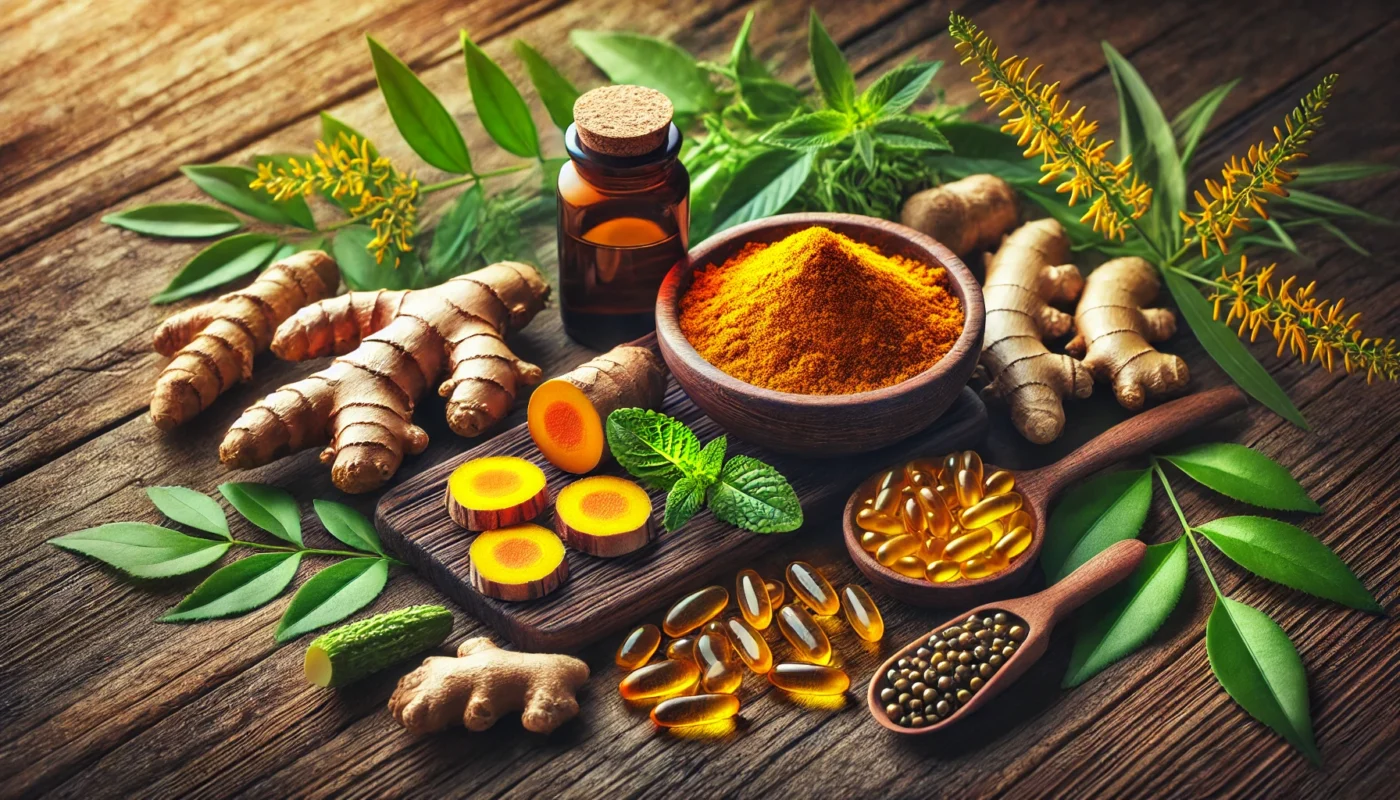Inflammation is a common health concern. It’s a natural response to injury or illness, but when it becomes chronic, it can lead to serious health issues.
Celebrex, a popular anti-inflammatory drug, is often prescribed to manage this condition. However, like many pharmaceuticals, it can come with side effects.
This has led many individuals to seek natural alternatives. These alternatives can offer similar benefits, potentially with fewer side effects.
In this comprehensive guide, we’ll explore a variety of natural alternatives to Celebrex. We’ll delve into herbs, supplements, and vitamins known for their anti-inflammatory properties.
We’ll also critically review scientific research supporting these alternatives. This will provide you with a solid understanding of their efficacy.
Moreover, we’ll offer practical advice on how to incorporate these natural remedies into your health regimen. This will help you make informed decisions about managing inflammation and pain.
Whether you’re a fitness enthusiast, a health enthusiast, or a medical patient, this guide is designed to help you navigate the world of natural anti-inflammatory solutions.
Join us as we explore the potential of nature’s pharmacy in offering relief from inflammation.
You may also like: Top Supplements to Speed Up Injury Recovery
Understanding Inflammation and Celebrex
Inflammation is a complex biological response. It’s designed to protect the body by removing harmful stimuli. However, when inflammation becomes chronic, it can result in long-term health problems.
The inflammation process is a double-edged sword. On one side, it’s essential for healing; on the other, it can cause damage if unchecked. Conditions like arthritis, heart disease, and even Alzheimer’s have links to chronic inflammation.
Celebrex (celecoxib) is a nonsteroidal anti-inflammatory drug (NSAID). It’s often prescribed to help manage pain and inflammation associated with arthritis and other conditions. This drug works by inhibiting the COX-2 enzyme, reducing inflammation and pain.
While Celebrex can be effective, it may cause side effects. Some individuals experience stomach pain, heartburn, or even cardiovascular issues. It’s crucial to weigh the benefits against the potential risks.
Understanding how Celebrex works can help in exploring natural options. There are many natural remedies known for their anti-inflammatory properties. These range from dietary changes to specific supplements.
Here are some key aspects of inflammation and Celebrex:
- Celebrex inhibits the COX-2 enzyme to reduce inflammation.
- Chronic inflammation links to various health issues.
- Natural alternatives may offer similar benefits with less risk.
The Role of Celebrex in Managing Inflammation
Celebrex is a common choice for managing pain and inflammation. As a COX-2 inhibitor, it offers targeted relief. Unlike traditional NSAIDs, Celebrex is selective, focusing mainly on the COX-2 enzyme.
This selectivity often results in fewer gastric issues, a common side effect of NSAIDs. Consequently, many doctors prefer Celebrex, especially for long-term use. Despite this advantage, the drug is not without potential downsides.
Long-term use of Celebrex may raise cardiovascular risks. Patients taking Celebrex should monitor their heart health regularly. For those concerned about these risks, natural alternatives present a viable option.
The Search for Natural Alternatives
Many people seek natural alternatives to Celebrex. This shift is due to concern over side effects associated with pharmaceuticals. Natural remedies may provide a safer approach to managing inflammation and pain.
Herbs like turmeric and ginger have gained attention for their strong anti-inflammatory properties. Supplements such as omega-3 fatty acids offer a promising alternative, promoting reduced inflammation levels.
Vitamins and minerals also play a crucial role. Vitamin D and magnesium, for example, are essential in combating inflammation. They support overall health while helping manage inflammation naturally.
Exploring these options allows individuals to maintain health with potentially fewer side effects. Combining knowledge of natural alternatives with medical guidance optimizes treatment plans.

The Science Behind Natural Anti-Inflammatory Agents
Scientific research continues to unveil the potential of natural compounds in managing inflammation. These agents often provide similar benefits to traditional medications. They do this with fewer side effects and are sometimes better tolerated.
Understanding how these natural substances work is key. Many of them help reduce inflammation through antioxidant activity. Antioxidants neutralize free radicals, which can otherwise exacerbate inflammation. This mechanism is common in many natural anti-inflammatory agents.
Some natural compounds also inhibit specific enzymes like Celebrex does. For instance, many plant-based compounds can reduce COX-2 enzyme activity. This inhibition helps lower inflammation without affecting stomach lining, a common issue with some NSAIDs.
Herbs and supplements often contain multiple active ingredients. This synergistic effect can enhance their overall efficacy. It suggests that using a combination of natural agents might offer broader benefits than isolated use.
Several natural agents have consistently shown promise. These include:
- Curcumin from turmeric, known for significant anti-inflammatory effects.
- Omega-3 fatty acids, particularly effective in reducing inflammatory cytokines.
- Green tea extract, rich in the antioxidant EGCG, supports reduced inflammation.
- Boswellia and ginger, both with substantial evidence for managing chronic inflammation.
Embracing these options requires an informed approach. Consider individual responses and any interactions with current treatments. Consulting healthcare professionals can ensure safe and effective integration into daily routines.
Curcumin: The Power of Turmeric
Curcumin is the star compound found in turmeric. Known for its vibrant yellow color, it’s also a potent anti-inflammatory agent. It works by inhibiting several molecules that play a role in inflammation.
Research suggests curcumin can be as effective as some anti-inflammatory medications. It’s particularly promising in managing arthritis and other chronic inflammatory conditions. However, curcumin’s bioavailability poses a challenge.
Curcumin is not easily absorbed into the bloodstream. Therefore, it’s often recommended to take it with black pepper or fats to enhance absorption. This improvement can help maximize its anti-inflammatory benefits.
Omega-3 Fatty Acids: Beyond Fish Oil
Omega-3 fatty acids are essential fats found in various foods. Fish oil is a well-known source, but chia seeds and flaxseeds are also rich in these nutrients. Omega-3s work by reducing the production of inflammation-promoting compounds.
These fatty acids are known to lower the level of prostaglandins, which are involved in the inflammatory process. Regular consumption can lead to reduced stiffness and joint pain, particularly in conditions like rheumatoid arthritis.
Beyond their anti-inflammatory properties, omega-3s support heart health. They help regulate cholesterol levels and may even lower blood pressure. Incorporating omega-3-rich foods or supplements is a straightforward way to enhance health.
Green Tea Extract: A Potent Antioxidant
Green tea extract is a powerful source of antioxidants, primarily EGCG (epigallocatechin gallate). This compound has been shown to reduce inflammation in numerous studies. It achieves this by neutralizing free radicals and reducing oxidative stress.
Drinking green tea or taking its extract can help manage inflammation-related conditions. It’s particularly effective in reducing the risk of chronic diseases like heart disease and neurodegenerative disorders. The extract can also boost metabolism and improve brain function.
It’s best to consume green tea regularly to reap these benefits. Aim for two to three cups a day if you’re opting for the beverage. For those who prefer supplements, follow recommended dosages to avoid any adverse effects.
Herbal Heroes: Boswellia and Ginger
Boswellia, also known as Indian frankincense, is a treasured herbal remedy. It’s known for its ability to reduce chronic inflammation. Boswellic acids, the active components, inhibit pro-inflammatory enzymes in the body.
Clinical studies have demonstrated Boswellia’s effectiveness in managing conditions like osteoarthritis. Regular use can improve mobility and reduce pain. It’s an excellent option for those seeking natural joint support.
Ginger, another potent anti-inflammatory herb, is rich in gingerols. These compounds have shown to effectively decrease inflammation markers. Beyond inflammation, ginger is also renowned for its anti-nausea properties.
Both herbs can be integrated into the diet or consumed as supplements. They offer a natural path to managing inflammation with a long history of traditional use.

Vitamins and Minerals as Inflammation Fighters
Vitamins and minerals play a key role in reducing inflammation. They often work by supporting the immune system. This helps the body manage inflammatory responses more efficiently.
Several key nutrients have been highlighted for their anti-inflammatory effects. These not only address inflammation but also contribute to overall health. Their impact is both broad and profound.
Here’s a closer look at some vitamins and minerals noted for their anti-inflammatory properties:
- Vitamin D: Crucial for immune regulation and reducing inflammation markers.
- Magnesium: Helps in modulating inflammatory processes and maintaining immune function.
- Zinc: Essential for immune system operation, indirectly affecting inflammation levels.
- Selenium: Works as an antioxidant, reducing oxidative stress and inflammation.
Ensuring adequate intake of these nutrients is vital. A balanced diet typically provides these naturally, though supplements can be considered if deficiencies exist. Consult with healthcare providers for personalized advice.
In addition to promoting a healthy diet, mindful supplementation might be necessary. Consider factors like diet restrictions, lifestyle, and specific health concerns. This approach can create a solid foundation for managing inflammation naturally.
Vitamin D: The Sunshine Vitamin
Vitamin D is well-known for its role in bone health. It also plays a crucial part in regulating inflammation. Low levels of vitamin D have been linked to increased inflammation and chronic conditions.
Sun exposure is a primary source of vitamin D. However, many people may not get enough from sunlight alone. Supplementing can be beneficial, especially in colder climates or during winter months.
Magnesium: The Multi-Tasking Mineral
Magnesium is involved in over 300 biochemical reactions in the body. It’s essential for nerve and muscle function, but its role in inflammation is gaining attention. Magnesium deficiency is linked to chronic inflammation.
A diet rich in magnesium includes leafy greens, nuts, and whole grains. Many people lack sufficient magnesium, making supplementation a practical option. Ensuring adequate magnesium intake can be a simple step toward reducing inflammation.
Topical and Dietary Strategies for Reducing Inflammation
Addressing inflammation requires a comprehensive approach. Both topical remedies and dietary changes can play significant roles. These strategies provide immediate relief and long-term health benefits.
Topical treatments can reduce pain and inflammation locally. These are particularly useful for specific joint or muscle issues. They act directly on the affected area, offering targeted relief.
Dietary strategies, on the other hand, impact inflammation systemically. They work by supporting the body’s natural defenses through nutrient-rich foods. This helps manage underlying causes of inflammation.
Consider incorporating these strategies into your routine for managing inflammation:
- Use natural creams and salves to provide immediate relief to affected areas.
- Adopt an anti-inflammatory diet, emphasizing fruits, vegetables, and healthy fats.
- Reduce intake of processed foods that may exacerbate inflammation.
- Stay hydrated to support overall bodily functions and reduce inflammation.
- Monitor dietary intake to ensure a balance of essential vitamins and minerals.
Combining both topical and dietary methods can enhance overall results. It’s important to find what works best for your body’s needs. Consulting with healthcare professionals can ensure a safe and effective approach.
Natural Topical Remedies: Creams and Salves
Topical remedies offer direct relief for inflammation. They often contain plant-based ingredients known for their soothing properties. These include herbs like arnica, eucalyptus, and menthol.
Arnica is particularly noted for its pain-relieving abilities. It can help with bruises and soreness. Eucalyptus oil, with its cooling sensation, can reduce swelling and discomfort.
These creams and salves are applied externally, meaning fewer systemic side effects. They are convenient for on-the-go application and can be used alongside other treatments. This makes them a versatile option for managing mild to moderate inflammation.
The Anti-Inflammatory Diet: Foods That Heal
An anti-inflammatory diet focuses on whole, unprocessed foods. It emphasizes fresh fruits, vegetables, nuts, and seeds. These foods offer a wealth of antioxidants and nutrients that combat inflammation.
Foods rich in omega-3 fatty acids, like salmon and walnuts, are particularly beneficial. They help reduce inflammatory markers in the body. Leafy greens such as spinach and kale are also excellent choices.
Avoiding pro-inflammatory foods is just as important. Limit intake of sugars, refined carbohydrates, and trans fats. These can exacerbate inflammation, while whole foods promote overall health. Adopting these dietary changes can lead to noticeable improvements in wellbeing.
Supplements and Herbs: A Closer Look at Efficacy and Safety
Exploring natural supplements and herbs for inflammation requires careful consideration. These natural remedies can complement a holistic health regimen. However, understanding their efficacy and safety is essential for optimal results.
Herbs like turmeric, ginger, and boswellia are popular choices. They contain compounds that reduce inflammation effectively. Many users report experiencing relief with these supplements.
Let’s examine some key benefits and considerations:
- Turmeric and ginger have strong scientific backing for their anti-inflammatory properties.
- Boswellia and bromelain show promise in managing chronic inflammation.
- Capsaicin and willow bark are traditional remedies proving effective for many.
These supplements are not one-size-fits-all. Individual responses can vary, highlighting the need for personalized approaches. Consulting with a healthcare provider is crucial before adding them to your routine.
Quality and sourcing are vital factors. Ensure supplements come from reputable companies and contain pure ingredients. This minimizes the risk of contamination and enhances efficacy.
Evaluating the Best Inflammatory Supplements
Evaluating supplements involves looking at scientific evidence and user experiences. Turmeric’s curcumin is renowned for its potent anti-inflammatory effects. Studies have shown it can significantly reduce inflammatory markers.
Another supplement, omega-3 fatty acids, is derived from fish oil or algae. It is praised for supporting heart health and reducing inflammation. These benefits make it a staple in many health regimens.
For joint health, glucosamine and chondroitin are popular choices. They are believed to support cartilage and reduce joint inflammation. Despite mixed evidence, many individuals find relief with consistent use.
Safety and Interactions: What You Need to Know
Safety is a top concern when adding supplements to your health regimen. Natural does not always mean risk-free. Some supplements can interact with medications or cause side effects.
Turmeric, for example, may affect blood-thinning medications. Users should be cautious and consult their healthcare provider. Understanding these interactions helps avoid adverse effects.
Herbal supplements like ginkgo can interact with anticoagulants, affecting blood clotting. St. John’s wort can impact the efficacy of antidepressants and other medications. Awareness of these risks is vital for safe use.
Quality control in the supplement industry varies. Always choose products that have been third-party tested. This can provide assurance that the supplements contain what the label promises.
Holistic Approaches to Managing Inflammation
Managing inflammation involves a blend of lifestyle choices and holistic practices. These approaches complement dietary and supplement strategies. Embracing a holistic view can lead to more comprehensive results.
Several natural practices can help reduce inflammation. These methods harness the body’s innate healing capabilities. Emphasizing balance and well-being is key to their effectiveness.
Consider these holistic strategies:
- Regular physical activity to maintain joint health.
- Stress reduction through mindfulness and relaxation techniques.
- Adequate sleep for recovery and immune support.
- A balanced diet filled with anti-inflammatory foods.
- Integrating complementary therapies like acupuncture and massage.
Each approach targets inflammation differently. Combining them offers a synergistic effect. This comprehensive method can enhance overall health.
Employing these strategies often requires a mindset shift. It’s about prioritizing long-term health over short-term relief. Gradual integration of these practices can yield substantial benefits.
The Role of Exercise and Physical Activity
Exercise plays a crucial role in reducing inflammation. Regular activity helps maintain mobility and joint function. It’s also a natural way to support the immune system.
Physical activity doesn’t need to be strenuous to be effective. Moderate aerobic exercise like walking or cycling can reduce inflammatory markers. Muscle-strengthening activities can further enhance these benefits.
Consistency is key to reaping the rewards of exercise. Aim for at least 30 minutes most days of the week. Adjust the intensity based on your fitness level and goals.
Stress Management and Mind-Body Techniques
Stress can significantly impact inflammation levels. Elevated stress can lead to increased inflammatory responses. Managing stress is thus essential for inflammation control.
Mind-body techniques like meditation and yoga are powerful tools. They promote relaxation and reduce stress-related inflammation. These practices encourage the body to enter a state of repair and balance.
Incorporating relaxation techniques into daily life can be simple. Start with deep-breathing exercises or short meditation sessions. Gradually build these practices into longer, more structured routines.

Implementing a Natural Anti-Inflammatory Regimen
Initiating a natural anti-inflammatory regimen requires thoughtful planning. This involves identifying what works best for your unique needs. A tailored approach can be more effective.
Start by evaluating your current lifestyle habits. Consider factors like diet, activity levels, and stress management. Understanding your baseline helps identify areas for improvement.
Incorporate diverse strategies into your daily routine. Here are a few suggestions:
- Introduce anti-inflammatory foods like leafy greens, berries, and nuts.
- Practice mindfulness or yoga to support mental and emotional health.
- Engage in regular physical activity tailored to your interests.
- Optimize sleep quality by establishing a consistent routine.
- Explore natural supplements proven to reduce inflammation.
Commitment to these changes is crucial. Making small, incremental adjustments increases the likelihood of success. Celebrate each progress milestone as it comes.
A flexible mindset benefits this process. Be open to trying new approaches or modifying existing ones. This adaptability facilitates lasting change and improvement.
Creating Your Personalized Plan
Crafting a personalized plan involves aligning strategies with your goals. Begin by setting clear, achievable objectives. These goals will guide your choices and keep you focused.
Research various options and choose those resonating with your lifestyle. Incorporate practices you enjoy to sustain motivation. Engaging in enjoyable activities fosters consistency.
Develop a structured plan to follow. Outline specific actions you’ll take daily or weekly. This might include meal planning, exercise schedules, and stress-relief techniques.
Consider the resources you have available. This includes time, support systems, and access to ingredients or activities. These factors will influence your plan’s success.
Monitoring Progress and Adjusting as Needed
Tracking your progress is vital for maintaining momentum. Document changes in symptoms, energy levels, or mood. Noting these details helps assess what works and what doesn’t.
Set regular intervals to evaluate your plan’s effectiveness. Monthly reviews can highlight patterns and provide insights. Use this information to adjust your strategies accordingly.
Stay informed about new research and practices. Evolving information can inspire changes to your regimen. Incorporate fresh insights to enhance your results.
Be patient with yourself throughout this journey. Recognize that improvement takes time. Adapting to feedback and tweaking your approach keeps your regimen effective and sustainable.
Conclusion: The Future of Natural Anti-Inflammatory Solutions
The future of natural anti-inflammatory solutions is promising. As awareness grows, more people seek alternatives to traditional medications. These natural options can provide relief with fewer side effects.
Ongoing research continues to uncover the potential of these remedies. Innovations in natural health science broaden our understanding. This evolving knowledge fuels more effective solutions.
Embracing natural approaches encourages a holistic view of health. This encompasses lifestyle choices, dietary changes, and stress management. By integrating these elements, individuals can achieve better overall well-being.
Staying Informed: Research and Developments
Staying informed about new research is vital. The field of natural medicine evolves rapidly. This keeps you up-to-date with the latest findings.
Subscribe to reputable health journals and newsletters. These sources provide insights into ongoing developments. Engaging with recent studies can guide your choices.
Personal Stories: Success with Natural Alternatives
Personal stories of success offer inspiration and hope. Many individuals have found relief using natural alternatives. Their experiences demonstrate the potential of these remedies.
Sharing these stories can connect and support others. Real-life examples highlight the effectiveness of natural approaches. They encourage others to explore holistic solutions.
Further Reading:
Harvard Health Publishing: Heart-safer NSAID alternatives
Well Theory: The 6 Best Natural Alternatives to NSAIDs
Medical News Today: 8 natural supplements to help fight inflammation
capsaicin, willow bark, anti-inflammatory supplements, turmeric, omega-3 fatty acids, glucosamine, chondroitin, natural remedies, inflammation management, holistic health, exercise, stress management, mindfulness, dietary changes, health supplements, personalized health plan, natural alternatives, wellness, quality control, herbal supplements
Important Note: The information contained in this article is for general informational purposes only, and should not be construed as health or medical advice, nor is it intended to diagnose, prevent, treat, or cure any disease or health condition. Before embarking on any diet, fitness regimen, or program of nutritional supplementation, it is advisable to consult your healthcare professional in order to determine its safety and probable efficacy in terms of your individual state of health.
Regarding Nutritional Supplements Or Other Non-Prescription Health Products: If any nutritional supplements or other non-prescription health products are mentioned in the foregoing article, any claims or statements made about them have not been evaluated by the U.S. Food and Drug Administration, and such nutritional supplements or other health products are not intended to diagnose, treat, cure, or prevent any disease.

